- Home
- George R. R. Martin
The Sworn Sword ttodae-2 Page 2
The Sworn Sword ttodae-2 Read online
Page 2
“See what you went and did, lunk,” said Bennis. “Couldn’t have it that the stream dried up, no. Might be this starts with water, but it’ll end with blood. Yours and mine, most like.” The brown knight drew his sword. “Well, no help for it now. There’s your thrice-damned diggers. Best we put some fear in them.” He raked his garron with his spurs and galloped through the grass.
Dunk had no choice but to follow. Ser Arlan’s longsword rode his hip, a good straight piece of steel. If these ditchdiggers have a lick of sense, they’ll run. Thunder’s hooves kicked up clods of dirt.
One man dropped his shovel at the sight of the oncoming knights, but that was all. There were a score of the diggers, short and tall, old and young, all baked brown by the sun. They formed a ragged line as Bennis slowed, clutching their spades and picks. “This is Coldmoat land,” one shouted.
“And that’s an Osgrey stream.” Bennis pointed with his longsword. “Who put that damned dam up?”
“Maester Cerrick made it,” said one young digger.
“No,” an older man insisted. “The gray pup pointed some and said do this and do that, but it were us who made it.”
“Then you can bloody well unmake it.”
The diggers’ eyes were sullen and defiant. One wiped the sweat off his brow with the back of his hand. No one spoke.
“You lot don’t hear so good,” said Bennis. “Do I need to lop me off an ear or two? Who’s first?”
“This is Webber land.” The old digger was a scrawny fellow, stooped and stubborn. “You got no right to be here. Lop off any ears and m’lady will drown you in a sack.”
Bennis rode closer. “Don’t see no ladies here, just some mouthy peasant.” He poked the digger’s bare brown chest with the point of his sword, just hard enough to draw a bead of blood.
He goes too far. “Put up your steel,” Dunk warned him. “This is not his doing. This maester set them to the task.”
“It’s for the crops, ser,” a jug-eared digger said. “The wheat was dying, the maester said. The pear trees, too.”
“Well, maybe them pear trees die, or maybe you do.”
“Your talk don’t frighten us,” said the old man.
“No?” Bennis made his longsword whistle, opening the old man’s cheek from ear to jaw. “I said, them pear trees die, or you do.” The digger’s blood ran red down one side of his face.
He should not have done that. Dunk had to swallow his rage. Bennis was on his side in this. “Get away from here,” he shouted at the diggers. “Go back to your lady’s castle.”
“Run,” Ser Bennis urged.
Three of them let go of their tools and did just that, sprinting through the grass. But another man, sunburned and brawny, hefted a pick and said, “There’s only two of them.”
“Shovels against swords is a fool’s fight, Jorgen,” the old man said, holding his face. Blood trickled through his fingers. “This won’t be the end of this. Don’t think it will.”
“One more word, and I might be the end o’ you.”
“We meant no harm to you,” Dunk said to the old man’s bloody face. “All we want is our water. Tell your lady that.”
“Oh, we’ll tell her, ser,” promised the brawny man, still clutching his pick. “That we will.”
On the way home they cut through the heart of Wat’s Wood, grateful for the small measure of shade provided by the trees. Even so, they cooked. Supposedly there were deer in the wood, but the only living things they saw were flies. They buzzed about Dunk’s face as he rode, and crept round Thunder’s eyes, irritating the big warhorse no end. The air was still, suffocating. At least in Dorne the days were dry, and at night it grew so cold I shivered in my cloak. In the Reach the nights were hardly cooler than the days, even this far north.
When ducking down beneath an overhanging limb, Dunk plucked a leaf and crumpled it between his fingers. It fell apart like thousand-year-old parchment in his hand. “There was no need to cut that man,” he told Bennis.
“A tickle on the cheek was all it was, to teach him to mind his tongue. I should of cut his bloody throat for him, only then the rest would of run like rabbits, and we’d of had to ride down the lot o’ them.”
“You’d kill twenty men?” Dunk said, incredulous.
“Twenty-two. That’s two more’n all your fingers and your toes, lunk. You have to kill them all, else they go telling tales.” They circled round a deadfall. “We should of told Ser Useless the drought dried up his little pissant stream.”
“Ser Eustace. You would have lied to him.”
“Aye, and why not? Who’s to tell him any different? The flies?” Bennis grinned a wet red grin. “Ser Useless never leaves the tower, except to see the boys down in the blackberries.”
“A sworn sword owes his lord the truth.”
“There’s truths and truths, lunk. Some don’t serve.” He spat. “The gods make droughts. A man can’t do a bloody buggering thing about the gods. The Red Widow, though… we tell Useless that bitch dog took his water, he’ll feel honor-bound to take it back. Wait and see. He’ll think he’s got to do something.”
“He should. Our smallfolk need that water for their crops.”
“Our smallfolk?” Ser Bennis brayed his laughter. “Was I off having a squat when Ser Useless made you his heir? How many smallfolk you figure you got? Ten? And that’s counting Squinty Jeyne’s half-wit son that don’t know which end o’ the ax to hold. Go make knights o’ every one, and we’ll have half as many as the Widow, and never mind her squires and her archers and the rest. You’d need both hands and both feet to count all them, and your bald-head boy’s fingers and toes, too.”
“I don’t need toes to count.” Dunk was sick of the heat, the flies, and the brown knight’s company. He may have ridden with Ser Arlan once, but that was years and years ago. The man is grown mean and false and craven. He put his heels into his horse and trotted on ahead, to put the smell behind him.
Standfast was a castle only by courtesy. Though it stood bravely atop a rocky hill and could be seen for leagues around, it was no more than a towerhouse. A partial collapse a few centuries ago had required some rebuilding, so the north and west faces were pale gray stone above the windows, and the old black stone below. Turrets had been added to the roofline during the repair, but only on the sides that were rebuilt; at the other two corners crouched ancient stone grotesques, so badly abraded by wind and weather that it was hard to say what they had been. The pinewood roof was flat, but badly warped and prone to leaks.
A crooked path led from the foot of the hill up to the tower, so narrow it could only be ridden single file. Dunk led the way on the ascent, with Bennis just behind. He could see Egg above them, standing on a jut of rock in his floppy straw hat.
They reined up in front of the little daub-and-wattle stable that nestled at the tower’s foot, half hidden under a misshapen heap of purple moss. The old man’s gray gelding was in one of the stalls, next to Maester. Egg and Sam Stoops had gotten the wine inside, it seemed. Hens were wandering the yard. Egg trotted over. “Did you find what happened to the stream?”
“The Red Widow’s dammed it up.” Dunk dismounted, and gave Thunder’s reins to Egg. “Don’t let him drink too much at once.”
“No, ser. I won’t.”
“Boy,” Ser Bennis called. “You can take my horse as well.”
Egg gave him an insolent look. “I’m not your squire.”
That tongue of his will get him hurt one day, Dunk thought. “You’ll take his horse, or you’ll get a clout in the ear.”
Egg made a sullen face, but did as he was bid. As he reached for the bridle, though, Ser Bennis hawked and spat. A glob of glistening red phlegm struck the boy between two toes. He gave the brown knight an icy look. “You spit on my foot, ser.”
Bennis clambered to the ground. “Aye. Next time I’ll spit in your face. I’ll have none o’ your bloody tongue.”
Dunk could see the anger in the boy’s eyes. “Tend to the horses,
Egg,” he said, before things got any worse. “We need to speak with Ser Eustace.”
The only entrance into Standfast was through an oak-and-iron door twenty feet above them. The bottom steps were blocks of smooth black stone, so worn they were bowl-shaped in the middle. Higher up, they gave way to a steep wooden stair that could be swung up like a drawbridge in times of trouble. Dunk shooed the hens aside and climbed two steps at a time.
Standfast was bigger than it appeared. Its deep vaults and cellars occupied a good part of the hill on which it perched. Aboveground, the tower boasted four stories. The upper two had windows and balconies, the lower two only arrow slits. It was cooler inside, but so dim that Dunk had to let his eyes adjust. Sam Stoops’ wife was on her knees by the hearth, sweeping out the ashes. “Is Ser Eustace above or below?” Dunk asked her.
“Up, ser.” The old woman was so hunched that her head was lower than her shoulders. “He just come back from visiting the boys, down in the blackberries.”
The boys were Eustace Osgrey’s sons: Edwyn, Harrold, Addam. Edwyn and Harrold had been knights, Addam a young squire. They had died on the Redgrass Field fifteen years ago, at the end of the Blackfyre Rebellion. “They died good deaths, fighting bravely for the king,” Ser Eustace told Dunk, “and I brought them home and buried them among the blackberries.” His wife was buried there as well. Whenever the old man breached a new cask of wine, he went down the hill to pour each of his boys a libation. “To the king!” he would call out loudly, just before he drank.
Ser Eustace’s bedchamber occupied the fourth floor of the tower, with his solar just below. That was where he would be found, Dunk knew, puttering amongst the chests and barrels. The solar’s thick gray walls were hung with rusted weaponry and captured banners, prizes from battles fought long centuries ago and now remembered by no one but Ser Eustace. Half the banners were mildewed, and all were badly faded and covered with dust, their once bright colors gone to gray and green.
Ser Eustace was scrubbing the dirt off a ruined shield with a rag when Dunk came up the steps. Bennis followed fragrant at his heels. The old knight’s eyes seemed to brighten a little at the sight of Dunk. “My good giant,” he declared, “and brave Ser Bennis. Come have a look at this. I found it in the bottom of that chest. A treasure, though fearfully neglected.”
It was a shield, or what remained of one. That was little enough. Almost half of it had been hacked away, and the rest was gray and splintered. The iron rim was solid rust, and the wood was full of wormholes. A few flakes of paint still clung to it, but too few to suggest a sigil.
“M’lord,” said Dunk. The Osgreys had not been lords for centuries, yet it pleased Ser Eustace to be styled so, echoing as it did the past glories of his House. “What is it?”
“The Little Lion’s shield.” The old man rubbed at the rim, and some flakes of rust came off. “Ser Wilbert Osgrey bore this at the battle where he died. I am sure you know the tale.”
“No, m’lord,” said Bennis. “We don’t, as it happens. The Little Lion, did you say? What, was he a dwarf or some such?”
“Certainly not.” The old knight’s mustache quivered. “Ser Wilbert was a tall and powerful man, and a great knight. The name was given him in childhood, as the youngest of five brothers. In his day there were still seven kings in the Seven Kingdoms, and Highgarden and the Rock were oft at war. The green kings ruled us then, the Gardeners. They were of the blood of old Garth Greenhand, and a green hand upon a white field was their kingly banner. Gyles the Third took his banners east, to war against the Storm King, and Wilbert’s brothers all went with him, for in those days the chequy lion always flew beside the green hand when the King of the Reach went forth to battle.
“Yet it happened that while King Gyles was away, the King of the Rock saw his chance to tear a bite out of the Reach, so he gathered up a host of westermen and came down upon us. The Osgreys were the Marshalls of the Northmarch, so it fell to the Little Lion to meet them. It was the fourth King Lancel who led the Lannisters, it seems to me, or mayhaps the fifth. Ser Wilbert blocked King Lancel’s path, and bid him halt. ’Come no farther,’ he said. ’You are not wanted here. I forbid you to set foot upon the Reach,’ But the Lannister ordered all his banners forward.
“They fought for half a day, the gold lion and the chequy. The Lannister was armed with a Valyrian sword that no common steel can match, so the Little Lion was hard pressed, his shield in ruins. In the end, bleeding from a dozen grievous wounds with his own blade broken in his hand, he threw himself headlong at his foe. King Lancel cut him near in half, the singers say, but as he died the Little Lion found the gap in the king’s armor beneath his arm, and plunged his dagger home. When their king died, the westermen turned back, and the Reach was saved.” The old man stroked the broken shield as tenderly as if it had been a child.
“Aye, m’lord,” Bennis croaked, “we could use a man like that today. Dunk and me had a look at your stream, m’lord. Dry as a bone, and not from no drought.”
The old man set the shield aside. “Tell me.” He took a seat and indicated that they should do the same. As the brown knight launched into the tale, he sat listening intently, with his chin up and his shoulders back, as upright as a lance.
In his youth, Ser Eustace Osgrey must have been the very picture of chivalry, tall and broad and handsome. Time and grief had worked their will on him, but he was still unbent, a big-boned, broad-shouldered, barrel-chested man with features as strong and sharp as some old eagle. His close-cropped hair had gone white as milk, but the thick mustache that hid his mouth remained an ashy gray. His eyebrows were the same color, the eyes beneath a paler shade of gray, and full of sadness.
They seemed to grow sadder still when Bennis touched upon the dam. “That stream has been known as the Chequy Water for a thousand years or more,” the old knight said. “I caught fish there as a boy, and my sons all did the same. Alysanne liked to splash in the shallows on hot summer days like this.” Alysanne had been his daughter, who had perished in the spring. “It was on the banks of the Chequy Water that I kissed a girl for the first time. A cousin, she was, my uncle’s youngest daughter, of the Osgreys of Leafy Lake. They are all gone now, even her.” His mustache quivered. “This cannot be borne, sers. The woman will not have my water. She will not have my chequy water.”
“Dam’s built strong, m’lord,” Ser Bennis warned. “Too strong for me and Ser Dunk to pull down in an hour, even with the bald-head boy to help. We’ll need ropes and picks and axes, and a dozen men. And that’s just for the work, not for the fighting.”
Ser Eustace stared at the Little Lion’s shield.
Dunk cleared his throat. “M’lord, as to that, when we came upon the diggers, well…”
“ Dunk, don’t trouble m’lord with trifles,” said Bennis. “I taught one fool a lesson, that was all.”
Ser Eustace looked up sharply. “What sort of lesson?”
“With my sword, as it were. A little claret on his cheek, that’s all it were, m’lord.”
The old knight looked long at him. “That… that was ill considered, ser. The woman has a spider’s heart. She murdered three of her husbands. And all her brothers died in swaddling clothes. Five, there were. Or six, mayhaps, I don’t recall. They stood between her and the castle. She would whip the skin off any peasant who displeased her, I do not doubt, but for you to cut one… no, she will not suffer such an insult. Make no mistake. She will come for you, as she came for Lem.”
“Dake, m’lord,” Ser Bennis said. “Begging your lordly pardon, you knew him and I never did, but his name were Dake.”
“If it please m’lord, I could go to Goldengrove and tell Lord Rowan of this dam,” said Dunk. Rowan was the old knight’s liege lord. The Red Widow held her lands of him as well.
“Rowan? No, look for no help there. Lord Rowan’s sister wed Lord Wyman’s cousin Wendell, so he is kin to the Red Widow. Besides, he loves me not. Ser Duncan, on the morrow you must make the rounds of all my villages, and
roust out every able-bodied man of fighting age. I am old, but I am not dead. The woman will soon find that the chequy lion still has claws!”
Two, Dunk thought glumly, and I am one of them.
Ser Eustace’s lands supported three small villages, none more than a handful of hovels, sheepfolds, and pigs. The largest boasted a thatched one-room sept with crude pictures of the Seven scratched upon the walls in charcoal. Mudge, a stoop-backed old swineherd who’d once been to Oldtown, led devotions there every seventh day. Twice a year a real septon came through to forgive sins in the Mother’s name. The smallfolk were glad of the forgiveness, but hated the septon’s visits all the same, since they were required to feed him.
They seemed no more pleased by the sight of Dunk and Egg. Dunk was known in the villages, if only as Ser Eustace’s new knight, but not so much as a cup of water was offered him. Most of the men were in the fields, so it was largely women and children who crept out of the hovels at their coming, along with a few grandfathers too infirm for work. Egg bore the Osgrey banner, the chequy lion green and gold, rampant upon its field of white. “We come from Standfast with Ser Eustace’s summons,” Dunk told the villagers. “Every able-bodied man between the ages of fifteen and fifty is commanded to assemble at the tower on the morrow.”
“Is it war?” asked one thin woman, with two children hiding behind her skirts and a babe sucking at her breast. “Is the black dragon come again?”
“There are no dragons in this, black or red,” Dunk told her. “This is between the chequy lion and the spiders. The Red Widow has taken your water.”
The woman nodded, though she looked askance when Egg took off his hat to fan his face. “That boy got no hair. He sick?”
“It’s shaved,” said Egg. He put the hat back on, turned Maester’s head, and rode off slowly.

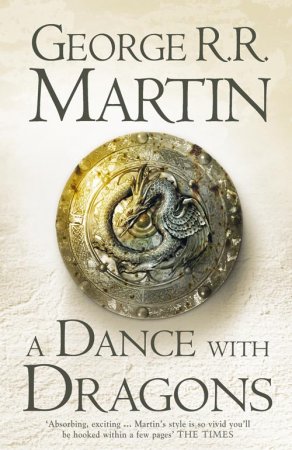 A Dance with Dragons
A Dance with Dragons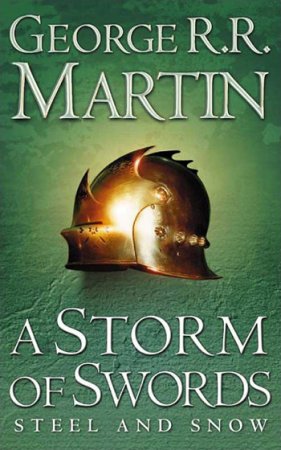 A Storm of Swords
A Storm of Swords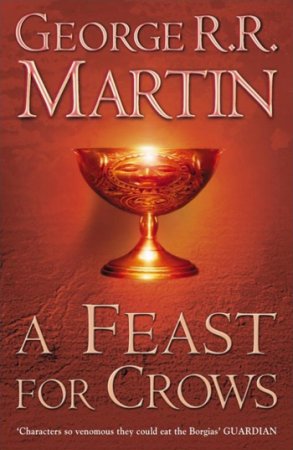 A Feast for Crows
A Feast for Crows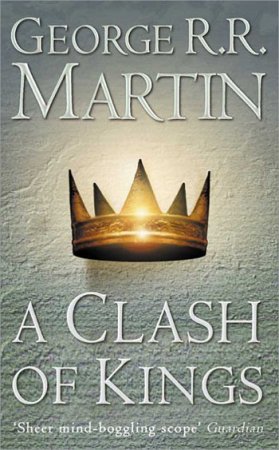 A Clash of Kings
A Clash of Kings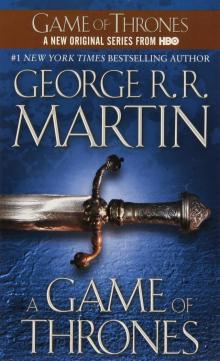 A Game of Thrones
A Game of Thrones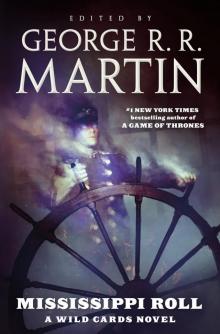 Mississippi Roll
Mississippi Roll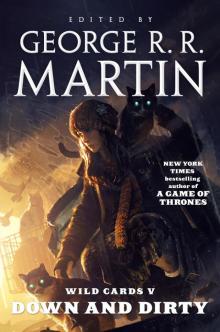 Wild Cards V: Down and Dirty
Wild Cards V: Down and Dirty Busted Flush
Busted Flush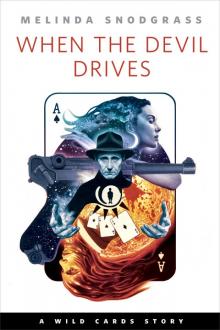 When the Devil Drives
When the Devil Drives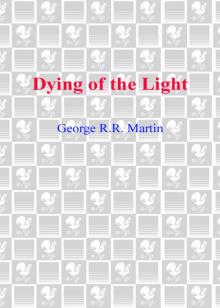 Dying of the Light
Dying of the Light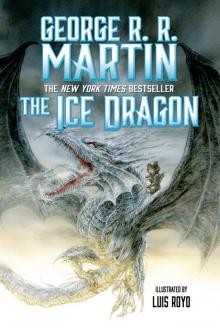 The Ice Dragon
The Ice Dragon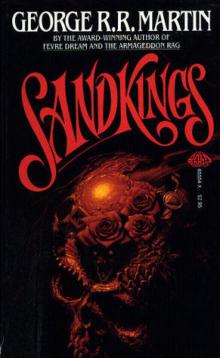 Sandkings
Sandkings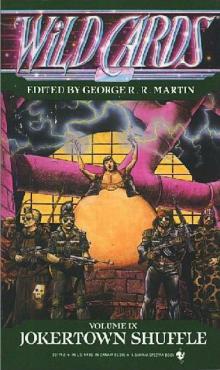 Jokertown Shuffle
Jokertown Shuffle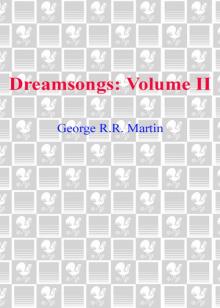 Dreamsongs. Volume II
Dreamsongs. Volume II Deuces Down
Deuces Down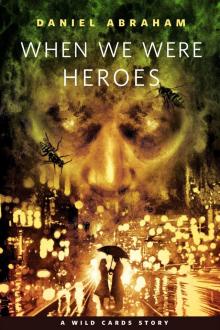 When We Were Heroes
When We Were Heroes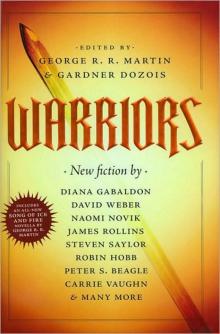 Warriors
Warriors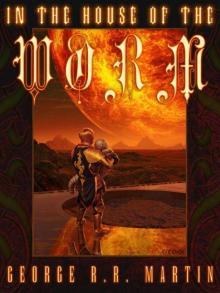 In the House of the Worm
In the House of the Worm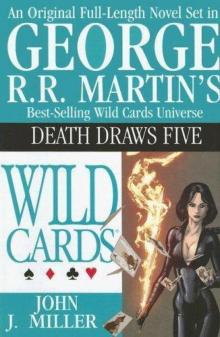 Death Draws Five
Death Draws Five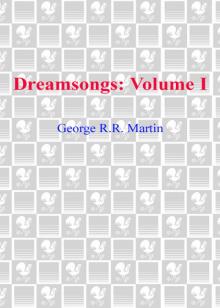 Dreamsongs. Volume I
Dreamsongs. Volume I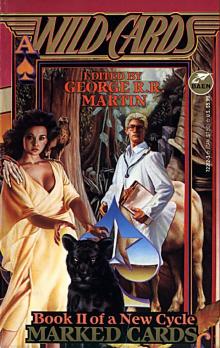 Marked Cards
Marked Cards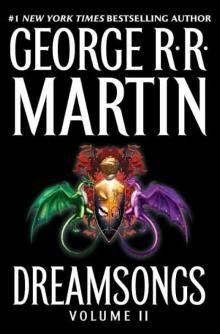 Dreamsongs
Dreamsongs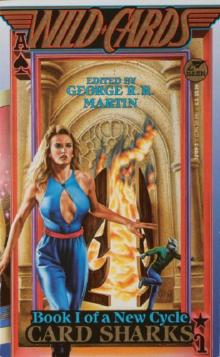 Card Sharks
Card Sharks Dangerous Women
Dangerous Women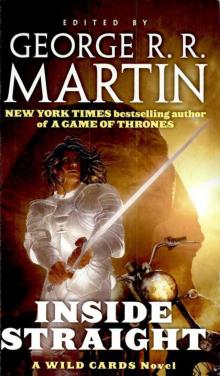 Inside Straight
Inside Straight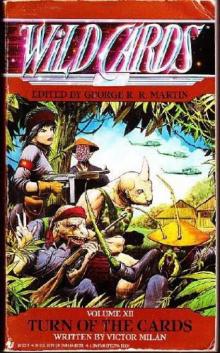 Turn of the Cards
Turn of the Cards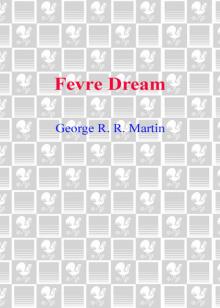 Fevre Dream
Fevre Dream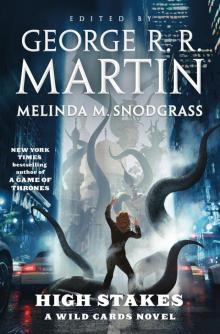 High Stakes: A Wild Cards Novel
High Stakes: A Wild Cards Novel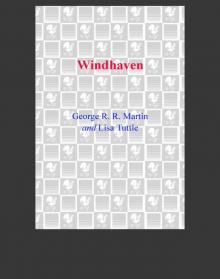 Windhaven
Windhaven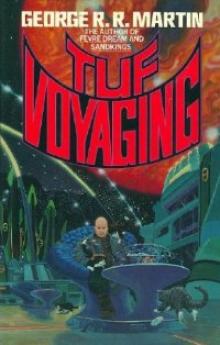 Tuf Voyaging
Tuf Voyaging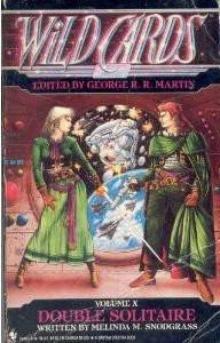 Double Solitaire
Double Solitaire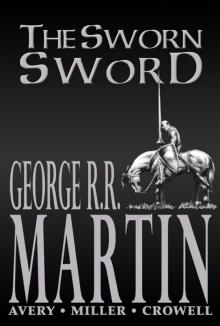 The Sworn Sword
The Sworn Sword Low Chicago
Low Chicago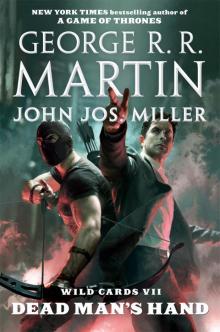 Dead Man's Hand
Dead Man's Hand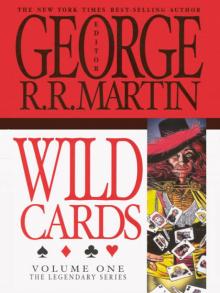 Wild Cards
Wild Cards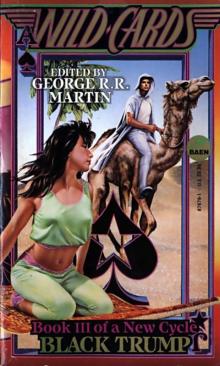 Black Trump
Black Trump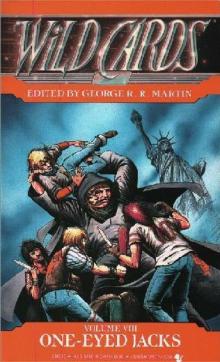 One Eyed Jacks
One Eyed Jacks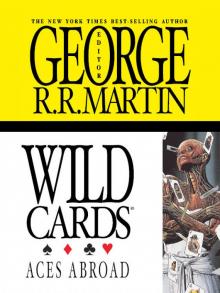 Wild Cards: Aces Abroad
Wild Cards: Aces Abroad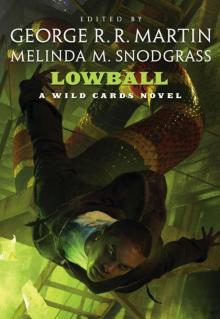 Lowball: A Wild Cards Novel
Lowball: A Wild Cards Novel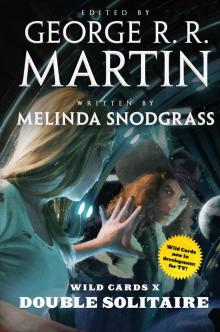 Double Solitaire (2019 Edition)
Double Solitaire (2019 Edition)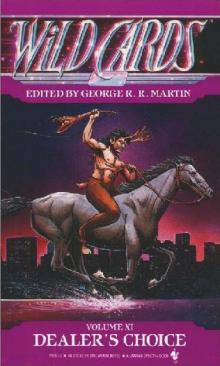 Dealer's Choice
Dealer's Choice Ace in the Hole
Ace in the Hole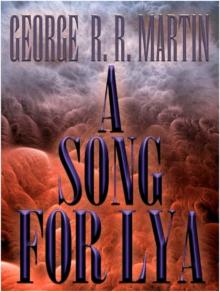 A Song for Lya: And Other Stories
A Song for Lya: And Other Stories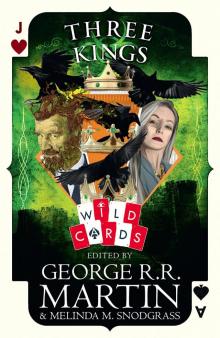 Three Kings
Three Kings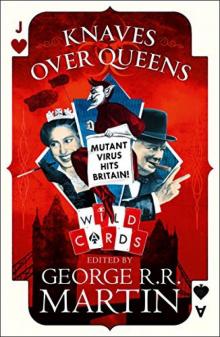 Knaves Over Queens
Knaves Over Queens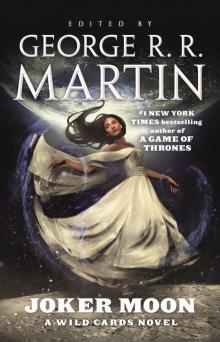 Joker Moon
Joker Moon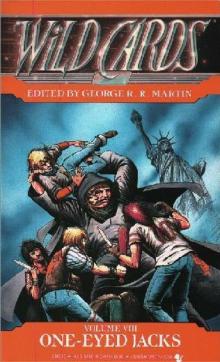 One Eyed Jacks wc-8
One Eyed Jacks wc-8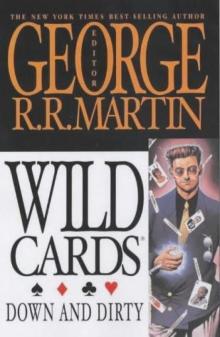 Down And Dirty wc-5
Down And Dirty wc-5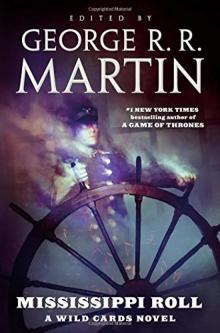 Mississippi Roll_A Wild Cards Novel
Mississippi Roll_A Wild Cards Novel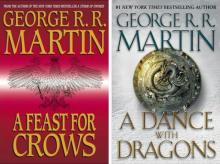 A Feast for Dragons
A Feast for Dragons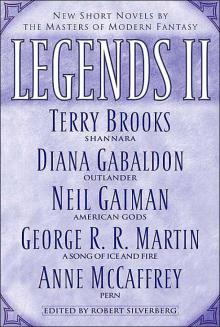 The Sworn Sword ttodae-2
The Sworn Sword ttodae-2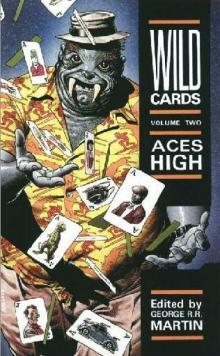 Aces High wc-2
Aces High wc-2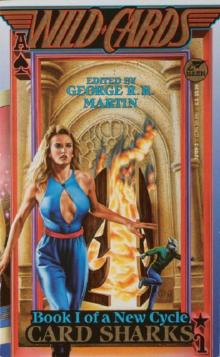 Wild Cards 13 : Card Sharks
Wild Cards 13 : Card Sharks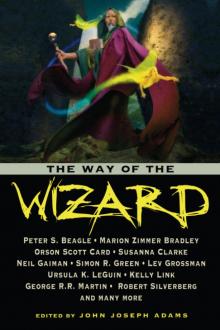 Way of the Wizard
Way of the Wizard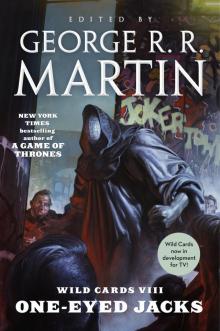 Wild Cards VIII: One-Eyed Jacks
Wild Cards VIII: One-Eyed Jacks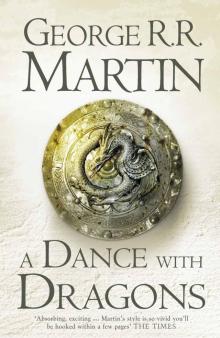 A Dance With Dragons: Book 5 of A Song of Ice and Fire (Song of Ice & Fire 5)
A Dance With Dragons: Book 5 of A Song of Ice and Fire (Song of Ice & Fire 5)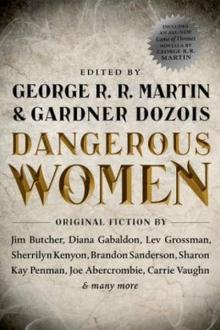 The Princess and The Queen, Or, The Blacks and The Greens (a song of ice and fire)
The Princess and The Queen, Or, The Blacks and The Greens (a song of ice and fire)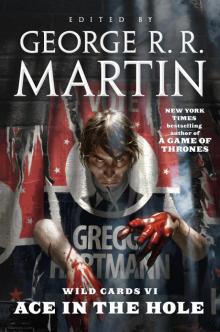 Wild Cards VI--Ace in the Hole
Wild Cards VI--Ace in the Hole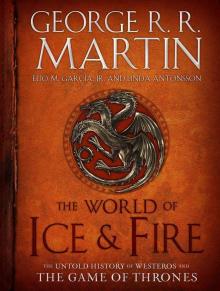 The World of Ice & Fire: The Untold History of Westeros and the Game of Thrones (A Song of Ice and Fire)
The World of Ice & Fire: The Untold History of Westeros and the Game of Thrones (A Song of Ice and Fire)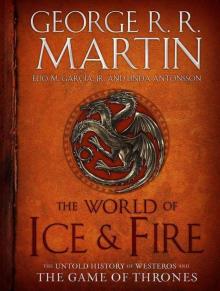 The World of Ice & Fire: The Untold History of Westeros and the Game of Thrones
The World of Ice & Fire: The Untold History of Westeros and the Game of Thrones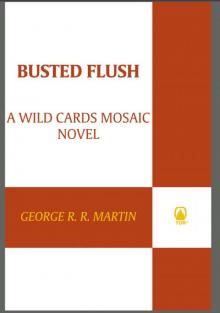 Busted Flush wc-19
Busted Flush wc-19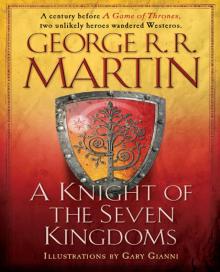 A Knight of the Seven Kingdoms
A Knight of the Seven Kingdoms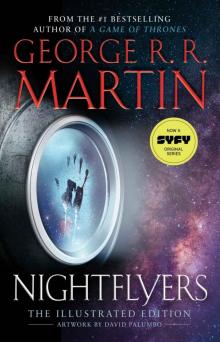 Nightflyers: The Illustrated Edition
Nightflyers: The Illustrated Edition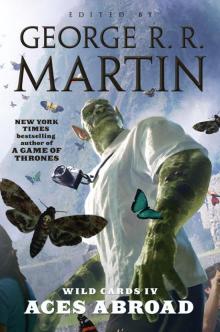 Wild Cards IV
Wild Cards IV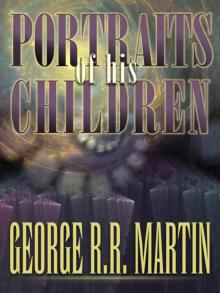 Portraits of His Children
Portraits of His Children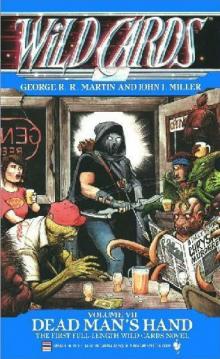 Dead Mans Hand wc-7
Dead Mans Hand wc-7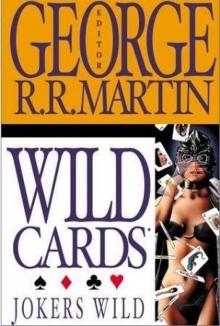 Jokers Wild wc-3
Jokers Wild wc-3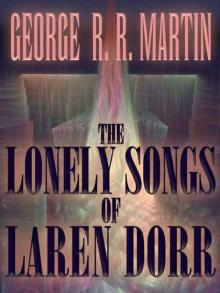 The Lonely Songs of Laren Dorr
The Lonely Songs of Laren Dorr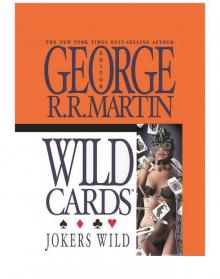 Wild Cards III: Jokers Wild
Wild Cards III: Jokers Wild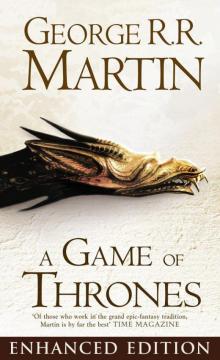 A Game of Thrones Enhanced Edition
A Game of Thrones Enhanced Edition Nightflyers & Other Stories
Nightflyers & Other Stories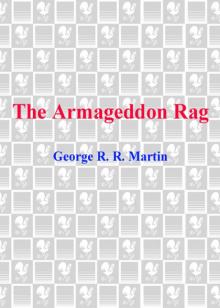 Armageddon Rag
Armageddon Rag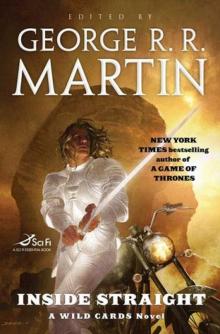 Wild Cards: Inside Straight
Wild Cards: Inside Straight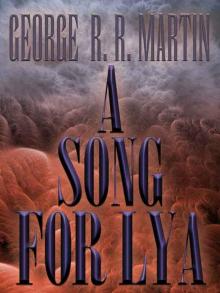 A Song for Lya
A Song for Lya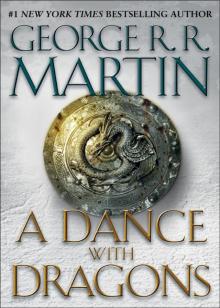 A Dance with Dragons: A Song of Ice and Fire: Book Five
A Dance with Dragons: A Song of Ice and Fire: Book Five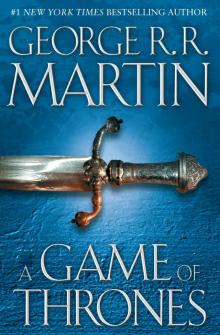 Song of Fire & Ice 01 - A Game of Thrones
Song of Fire & Ice 01 - A Game of Thrones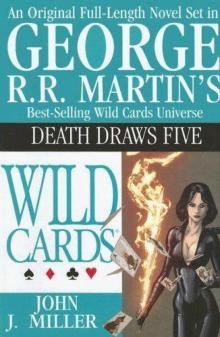 Death Draws Five wc-17
Death Draws Five wc-17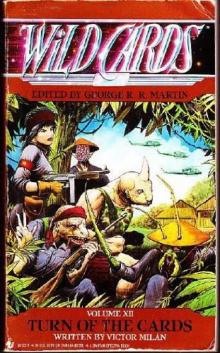 Turn of the Cards w-12
Turn of the Cards w-12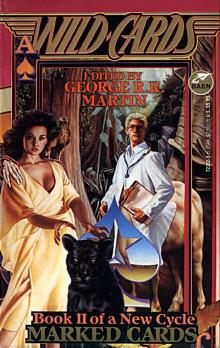 Wild Cards 14 - Marked Cards
Wild Cards 14 - Marked Cards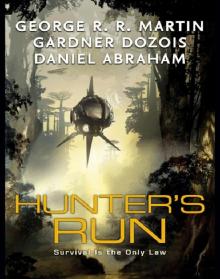 Hunter's Run
Hunter's Run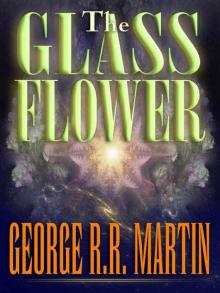 The Glass Flower
The Glass Flower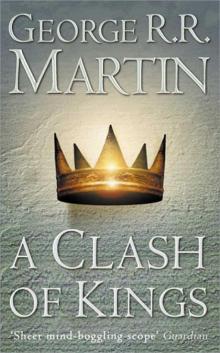 A Clash of Kings asoiaf-2
A Clash of Kings asoiaf-2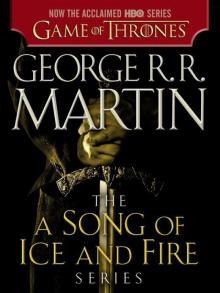 A Game of Thrones 5-Book Bundle: A Song of Ice and Fire Series: A Game of Thrones, A Clash of Kings, A Storm of Swords, A Feast for Crows, and A Dance with Dragons (Song of Ice & Fire)
A Game of Thrones 5-Book Bundle: A Song of Ice and Fire Series: A Game of Thrones, A Clash of Kings, A Storm of Swords, A Feast for Crows, and A Dance with Dragons (Song of Ice & Fire)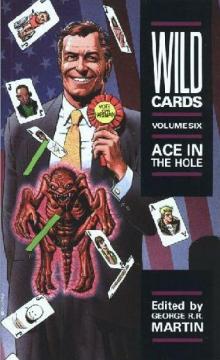 Ace In The Hole wc-6
Ace In The Hole wc-6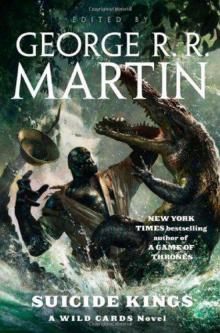 Suicide Kings wc-20
Suicide Kings wc-20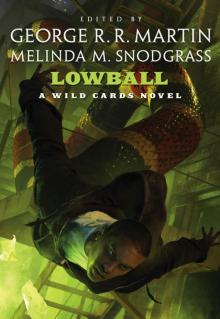 Lowball
Lowball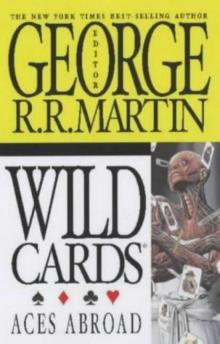 Aces Abroad wc-4
Aces Abroad wc-4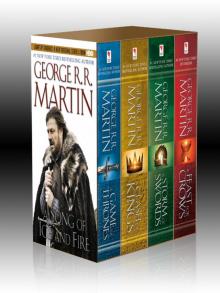 George R. R. Martin's a Game of Thrones 4-Book Bundle
George R. R. Martin's a Game of Thrones 4-Book Bundle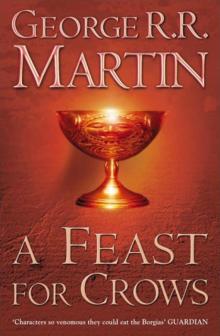 A Feast for Crows asoiaf-4
A Feast for Crows asoiaf-4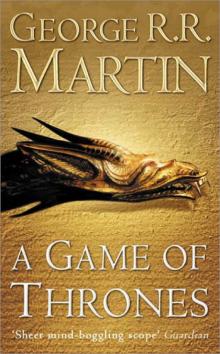 A Game of Thrones asoiaf-1
A Game of Thrones asoiaf-1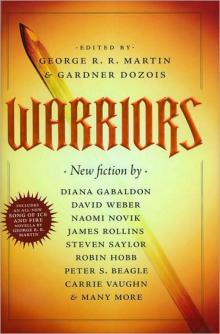 The Mystery Knight ttodae-3
The Mystery Knight ttodae-3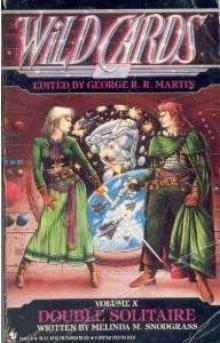 Double Solitaire w-10
Double Solitaire w-10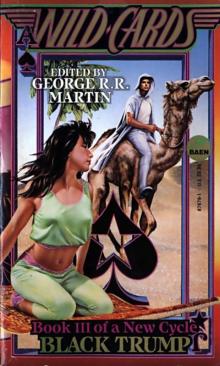 Wild Cards 15 - Black Trump
Wild Cards 15 - Black Trump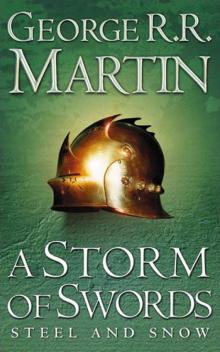 A Storm of Swords asoiaf-3
A Storm of Swords asoiaf-3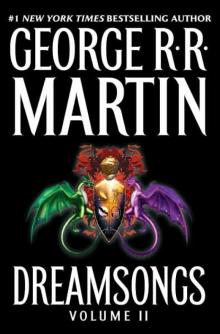 The Hedge Knight ttodae-1
The Hedge Knight ttodae-1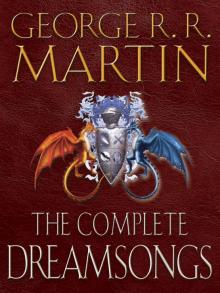 Dreamsongs 2-Book Bundle
Dreamsongs 2-Book Bundle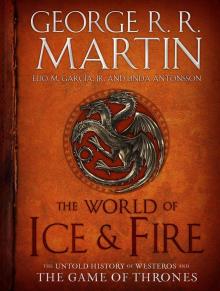 The World of Ice & Fire
The World of Ice & Fire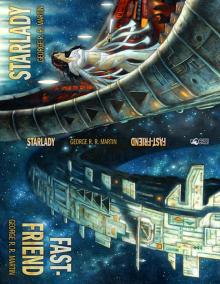 Starlady & Fast-Friend
Starlady & Fast-Friend Old Mars
Old Mars Fantasy For Good: A Charitable Anthology
Fantasy For Good: A Charitable Anthology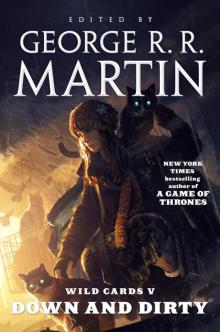 Wild Cards V
Wild Cards V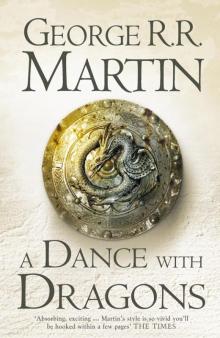 A Dance with Dragons asoiaf-5
A Dance with Dragons asoiaf-5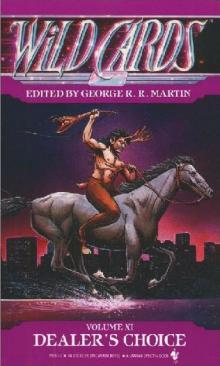 Dealer's Choice w-11
Dealer's Choice w-11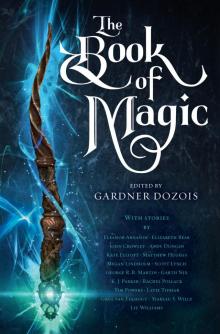 The Book of Magic
The Book of Magic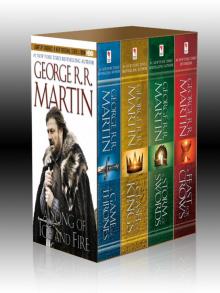 A Game of Thrones 4-Book Bundle
A Game of Thrones 4-Book Bundle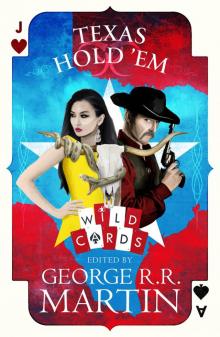 Texas Hold 'Em
Texas Hold 'Em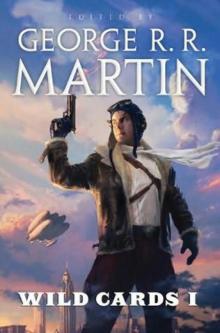 Wildcards wc-1
Wildcards wc-1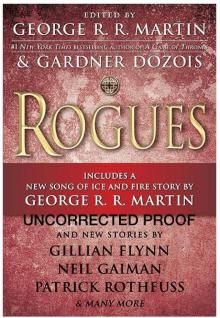 Rogues
Rogues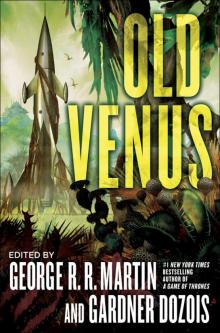 Old Venus
Old Venus